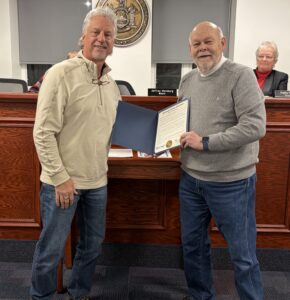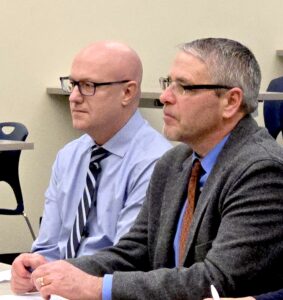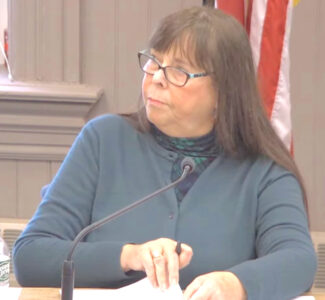Gowanda school board questions accountability during pandemic
Life in Gowanda
GOWANDA — Since March 16, students at Gowanda Central School district have been completing their school work at home, two days in advance of Governor Cuomo’s executive order to close all public schools for at least two weeks. During the March school board meeting — the first since the closure of school — school board members expressed concern regarding how teachers and administrators are holding students accountable for their work. The topic of teachers’ compensation came up, as some board members inquired about how all instructional staff could complete a full work day from home.
Superintendent Dr. Robert Anderson began the meeting by thanking all Gowanda staff, faculty and administrators for their hard work in transitioning instruction to an at-home/online format. He noted that the district has a target re-opening date of April 20, though that is subject to change.
According to Anderson, students can access their class materials through the school’s online platforms. Those who do not have internet at home are assigned paper packets that are available for pick up every Monday or can be dropped off to students by bus.
Board member Janet Vogtli asked who is keeping track of the distribution and collection of packets and checking in with students. Anderson explained that the building principals are tracking this information, and students’ teachers are calling and keeping track of work that is being completed offline.
Board member David Barnes and Vogtli expressed concern over students who may not do all or any of their school work at home. “Let’s say the third week, the teacher calls, and they get nothing,” Vogtli said. “What are they going to do? Whose responsibility is it (to enforce this)?”
Members discussed the possibility of School Resource Officer Ben Shields making home visits, though nothing was decided at the meeting. Board president Mark Nephew said, “Why don’t we give them (teachers) a chance to get procedures in place? We do have buses going out delivering meals. If we’re having contact with the family, that’s when we can drop off materials to kids or pick stuff up.”
Nephew asked Anderson whether or not the coming weeks would count toward the 180-day requirement for all New York public schools.
“There’s a slight possibility it will, but we don’t have any guidance on that,” he said. Importantly, Anderson noted, “July 1 through Aug. 30, school can’t be in session according to the state of New York. This is not an ideal circumstance, but under the circumstances, we’re at least providing the opportunity and the support here to make sure things can happen, but what people do in their homes, I don’t know.”
Board member Lynn Guzzetta inquired about the possibility of summer school, to which Anderson replied that there has been discussion about state and federal governments “opening up some resources for students this summer.”
Vogtli wondered how teachers of non-core classes, such as gym, music and art, are working from home. Anderson said these teachers are required to hold “office hours” during which they are accessible via phone and/or internet for two hours per day. He explained that they are completing paperwork from home, assisting in calling students and encouraging them to participate in activities like physical fitness. He added, “It is unstructured, but everybody is busy doing something.”
For some students, at-home learning is particularly challenging, such as students who receive special education services. Vogtli said she’d heard a rumor that special education students were exempt from completing school work at home.
Anderson responded, “All the guidance says we have to make sure special education kids are educated appropriately and that all the material we put out there is equitable and takes into account their individual learning needs.”
He acknowledged that this material varies widely depending on students’ abilities. For those students with a reading disability, he said, “Those people have resource teachers reaching out via phone and Zoom conferencing. “For those students with really specific needs, we have service providers, like occupational and physical therapists, still working with them one-on-one or at the school. We’re trying as best we can to accommodate their needs.”
Later in the meeting, the board discussed proposed memorandums of agreement between the district and Gowanda Teachers’ Association for additional special education instruction, effective Feb. 26 through June 26, 2020. Memorandums include an additional resource room for seventh and eighth grade students, a section of self-contained seventh and eighth grade social studies and a consultant teacher for middle school ELA.
Barnes was skeptical. “We’re approving additional compensation for teachers but we have nobody here?” he asked. “…I just don’t get it. I don’t know why we’re adding money to people who aren’t coming in to work.”
Anderson countered, “They are coming to work. They’re working remotely, and these kids are their responsibility.”
Barnes complained that the district is incurring extra expenses but that “there’s no concessions anywhere.”
Anderson said, “…Costs aside, we are meeting the educational needs of our students, and that’s what this agreement is for. It’s not a concession on anyone’s account. These kids need to be taught by a teacher, and I’ll explain that to anyone about why we have to do this.”
Barnes pointed out that the district is also paying for BOCES services, despite the fact that students aren’t able to attend BOCES classes or complete their internships at this time. Anderson acknowledged this. “We’ve already paid the bill for this year,” he said. Anderson explained that BOCES classes are similar to physical education, art, technology and music classes in that course content cannot be delivered easily or in some cases at all via internet or phone. He noted that this is an unfortunate reality of the COVID 19 situation but remained hopeful that schools would reopen soon.
Barnes was the only school board member who voted against items 5.02 through 8.06, which include memorandums of agreement for additional special education instruction and additional compensation for special education teachers Amy Ackley, Sherry Enders and Nicole Nellist.




